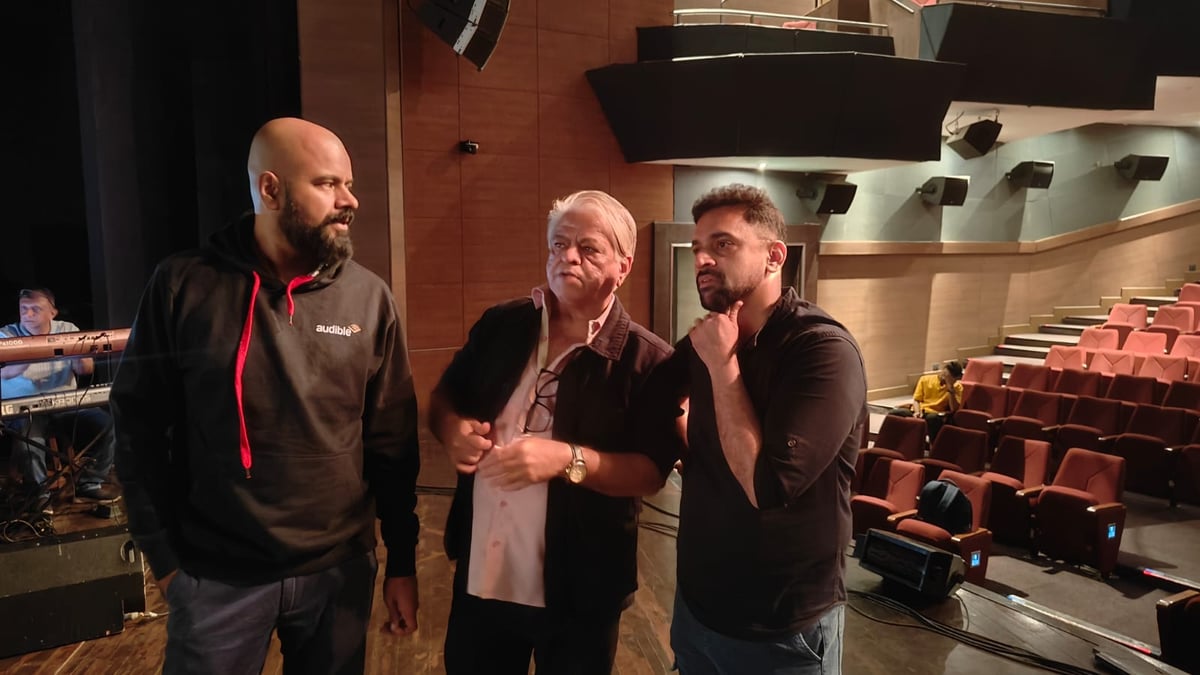The special and unusual feature of the musical play Bansuri Jab Gaane Lage is the way the two actors have been portrayed. While the female lead, Reshma Shetty, enacts five contrasting characters, her co-performer Vikas Rawat plays the bansuri.
The musical revolves around the life and music of master flautist Pt Hariprasad Chaurasia, and as such a different spin was chosen. As creative producer Suhail Abbasi explains, “Five women played an important role in Panditji’s life. They were his mother, who passed away when he was young, his sister, a neighborhood aunt, his wife Anuradha and his guru-ma Annapurna Devi. This was pointed out by Pushpanjali, his daughter-in-law, who is a treasure trove of information about him. Instead of different actresses, it was felt it would be appropriate to have one play all roles. And since the bansuri was Panditji’s common companion all through, it was decided to have an actor represent it.”

Presented by Vrindavan Gurukul and Eastern Harmony, Bansuri Jab Gaane Lage will begin with different venues in Mumbai. It will be staged at the Balgandharva Rangmandir, Bandra, on January 19, the Dinanath Mangeshkar Hall, Vile Parle, on January 24 and the Y.B. Chavan Auditorium in Nariman Point on February 15. There are plans to take it to other cities and even abroad.
The musical, which focuses on both Chaurasia’s classical and film music, has been directed by Bhushan Korgaonkar and Kunal Vijayakar, who have presented lavani-themed productions earlier. The script has been written by Abbasi and Pushpanjali Chaurasia. Says Korgaonkar, “I have worked with Reshma Shetty often and she is perfect for this musical. In fact even before reading the script, we thought of her. Besides acting, she is also a Bharatnatyam and Odissi dancer, and has also worked with school-children. She too felt this was a dream role.” Adds Vijayakar, “Though we hadn’t worked with Vikas earlier, both of us were convinced that the role was ideal for him. It was his sheer personality. He speaks smooth Hindi, and can also speak in the voices of other known personalities Panditji interacted with. Like Raj Kapoor and Yash Chopra.”

The idea to create a musical came after brainstorming sessions between Chaurasia’s son Rajeev and Abbasi. Rajeev had directed the documentary Bansuri Guru in 2013. Says Abbasi, “We were talking of doing something together. A feature film would have its own challenges so we felt a musical play would be ideal. Initial discussions were between Rajeev, Pushpanjali and me, and with the broad idea in mind, we started working on the script.”
Korgaonkar, a theatre director, writer and translator, was suggested by Abbasi. He got in Vijaykar as co-director. Says Korgaonkar, “it is similar yet different from what I have done earlier. Both lavani and this musical involve stories and songs. So in that sense they are similar. But here we were trying to learn more about one person. Though the script was ready when we came on board, we had to work a lot to understand Panditji’s contribution deeply. We saw Rajeev’s biography and it was very informative. We had separate meetings with Panditji and Anuradha-ji, who told us many anecdotes.” Adds Vijayakar, “These meetings enriched our knowledge and made us more confident as we got more deeply involved.”

In the play Chaurasia’s disciples Suchismita and Debopriya Chatterjee play bansuri, and Deepak Shah and Pratik Shah are on keyboards. Viraj Bhatia is on tabla and dholak, and the singing team comprises Ayesha Mukherjee, Srijonee Bhattacharjee and Shrikant Narayan.

In Hindi films, Chaurasia made a mark both as a flautist and as a music director, as part of the Shiv-Hari team with Pt Shivkumar Sharma. Some of his famous songs as flautist are Phir Wohi Shaam (from Jahan Ara), Jo Vaada Kiya Woh Nibhaana Padega (Taj Mahal), Aaj Phir Jeene Ki Tamanna Hai (Guide), Baharon Mera Jeevan Bhi Savaaron (Aakhri Khat), Suno Sajna Papihe Ne (Aaye Din Bahaar Ke) and Rang Barse (Silsila). As part of Shiv-Hari, he gave music for Silsila, Chandni, Lamhe and Darr, among other films.
Besides the music, Chaurasia’s life itself makes for an interesting story. Belonging to a wrestler’s family from Allahabad, he was fascinated by the bamboo flute from childhood. He would learn and practise the instrument without his father’s knowledge. He later learnt the instrument from Pt Bholanath Prasanna of Varanasi for eight years.

The play tracks his journey from Allahabad to Cuttack in Orissa, where he worked with All India Radio. Later he moved to Bombay. After some struggles, he got a break in film music, and soon began playing for all leading music directors. His main focus, of course, was classical music, which he learnt from Annapurna Devi. He tasted big success in the late 1960s nwith the album Call Of The Valley, which also featured Pt Shivkumar Sharma on santoor and Pt Brijbhushan Kabra on guitar.
Both directors felt it was not necessary to emphasise much on the sets and costumes. Says Vijayakar, “Rather than major costume changes, the focus will be more on how Reshma changes her style and accents as she plays different personalities.” Korgaonkar, likewise, says the arrangement of sets will be minimal. “The story and the music will be the soul of the show, and we would like to emphasise on that,” he adds. The singing bansuri is sure to create magic during the performances.
